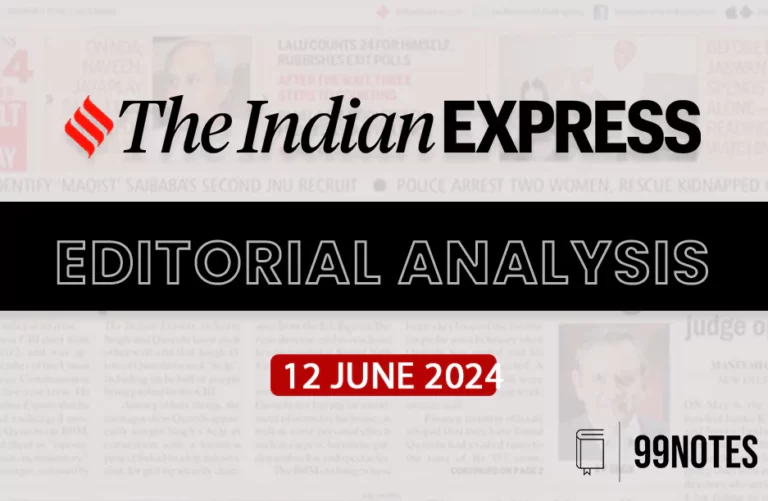28 August 2023 : Indian Express
Indian Express
- Indian Express
- 1. BRICS 2.0
- Context:
- Details:
- Is the expansion good for BRICS?
- Why were these six countries chosen?
- What issues were discussed at Johannesburg meet?
- Favourable outcomes of the meet for India:
- Major problems in front of BRICS.
- Way Forward:
- 2. SHORING UP THE FOUNDATIONS.
- Context:
- Details:
- Issues:
- Reasons for such decisions:
- What should be the correct approach?
- For Enquiry
28-August–2023
The Indian Express, CSE candidates can stay informed about current events and developments in India and around the world.
1. BRICS 2.0
Context:
- Among the 15 BRICS summits held so far, the meet that concluded in Johannesburg last week received the most attention globally.
- The decision to invite six countries — Argentina, Egypt, Ethiopia, Iran, Saudi Arabia, and the UAE—to join BRICS as full members and keep its doors open for further expansion has opened a new era.
Details:
- At Johannesburg, BRICS increased its membership to represent a larger share of world population, global GDP and international trade.
- This was initially driven by China with the backing of Russia and South Africa. But once India and Brazil accepted the principle of expansion, the choice of six new members was based on consensus.
- The accommodation was important, given that at least 23 countries of the Global South had conveyed interest in seeking BRICS membership.
- This was a recognition of the grouping’s value, notwithstanding the negative view taken by the West.
Is the expansion good for BRICS?
- The new BRICS -XI will have more political clout, but the extent of its increased influence will depend on building inner unity.
Why were these six countries chosen?
- Argentina was brought in to expand Latin American representation.
- Egypt, given its excellent ties with China and India, was a natural choice.
- Ethiopia was a surprise, the result of a compromise between the claims of Nigeria and Kenya.
- The inclusion of Saudi Arabia and the UAE will help in recapitalisation of the New Development Bank, enhancing its capacity to finance development projects.
- Iran’s entry reaffirms its strategic location as a bridge between West, Central and South Asia.
BRICS 2.0 will also have six of the top 10 oil-producing countries of Saudi Arabia, Russia, China, UAE, Brazil, and Iran—a definite global power shift and one not defined by the West.
What issues were discussed at Johannesburg meet?
- At Johannesburg, the leaders decided to direct the foreign ministers to “further develop the BRICS partner country model”
- Countries like Indonesia, Vietnam, Bangladesh, Mauritius, Nigeria, Kenya, and a Latin American country which are in line for admission were also discussed.
- The immediate rebalancing focus is UNSC membership for the original BRICS members — India, Brazil, and South Africa articulated in Paragraph 7 of the Johannesburg Declaration.
- This requires the support of the permanent members, China and Russia, or it will further expose their doublespeak on this issue.
- The question of a common BRICS currency also dominated the pre-summit headlines, despite the BRICS itself not seeking to create it.
- Paragraph 44 of the joint statement makes clear that the grouping will encourage local currencies in trade and financial transactions “between BRICS as well as their trading partners” and for “fast, inexpensive, transparent, safe and inclusive payment systems.”
- If it contributes to de-dollarisation, the outcome may not be unwelcome to a large segment of the international community.
Favourable outcomes of the meet for India:
- Both UNSC membership and local currency trade are welcome to India.
- It was reiterated that G20 is the premier multilateral forum for “international economic and financial cooperation”
- China and Russia conveyed their support for the successful hosting of successive G20 presidencies by India, Brazil, and South Africa.
- This generates hope that these two states may become a little more conciliatory, and a consensus-based Delhi Declaration is delivered at the G20 summit in September.
- The meeting between President Xi Jinping and Prime Minister Narendra Modi on the summit’s sidelines, may offer fresh impetus for expediting a workable resolution of the border issues in the western sector of Ladakh.
Major problems in front of BRICS.
- After Covid, Galwan, and Ukraine, BRICS faces a changed world in which its two members Russia and China are heavily involved in confrontation with the US-led West.
- The other BRICS members do have differences with the existing global order, but they prefer reform through dialogue.
Way Forward:
- As the six new members join BRICS, the inner dynamics will evolve further which remains to be seen.
- India will have a seminal but challenging role, given its growing cooperation with the West on the one hand and its active articulation and pursuit of the interests of the Global South on the other.
2. SHORING UP THE FOUNDATIONS.
Context:
- More than half of the children in India are unable to read fluently with comprehension or do basic mathematical operations by the end of primary schooling.
- To address this, the National Education Policy (NEP 2020) suggested a national mission to ensure that all children attain foundational literacy and numeracy by the end of Grade 3.
Details:
- The National Initiative for Proficiency in Reading with Understanding and Numeracy (NIPUN Bharat) programme was started by the Centre in 2021 to improve the foundational learning of five crore students in government primary schools.
- NIPUN Bharat, despite certain limitations, has begun to slowly improve the learnings of children in Grades 1-3 in several states.
- However, in a recent decision, the Ministry of Education has rolled back the scope of NIPUN Bharat to children in Grades 1-2, leaving out children in Grade 3.
- The rationale provided for this shift is to bring about the alignment between NIPUN Bharat and the curricular structure suggested by the NEP 2020 and the National Curricular Framework (NCF2023).
- These latter documents envisage a “foundational stage of learning” that would include three years of preschool education and the first two years of primary schooling. Hence, the argument is that the NIPUN Bharat programme should also end at Grade 2.
Issues:
- Anganwadi centres catering to three to six-year-olds focus largely on health, immunisation and nutrition, and only a small proportion of centres provide pre-school education with any regularity or quality.
- In this context, the setting up of a three to eight-year block in which children receive well-planned, high-quality educational services is still a distant goal.
- The reality is that approximately 68 per cent of children in the three to six-year age group are not able to access educational services in India.
- Most children come from poorly literate home contexts and encounter literacy for the first time in Grade 1.
- Thirty five per cent of children spend several years of primary schooling navigating complex gaps between home and school languages.
- Therefore, to roll back a programme that supports the learning of children in Grade 3 is to let go of a bird in hand (support for children currently in Grade3), for two in the bush (the hope of a unified, functional schooling block for the three to eight-year-olds).
- The NCF has merely argued for appropriate pedagogical practices to be followed for children in the three to eight-year age group, for example, a focus on play-based learning, flexible pace of learning, and the like.
- The foundational stage described in the NEP and NCF does not intend to target the development of the whole range of literacy and numeracy skills, attitudes and knowledge required for all future learning in school by the end of Grade.
- Most research conducted across the world and especially in Indian contexts show that these understandings develop slowly during the first four or five years of schooling.
Reasons for such decisions:
- One of the reasons for such decisions is an inadequate understanding of what it means to establish strong foundations for early literacy and numeracy.
- It is possible that literacy, for example, is being understood as the ability to blend letters to read words at a certain pace by a certain age.
- Programmes like NIPUN Bharat have also contributed to the emergence of such an imagination.
What should be the correct approach?
- We should be providing extra support for children through Grades 1-5 so that they have enough time to establish robust foundations for language and numeracy learning.
- Rather than cutting back on such programmes, it becomes all the more important to broaden our vision of early foundational learning to include a focus on the relevance of literacy to children’s lives, strong oral expression, deep, inferential comprehension, enjoyment and appreciation of literature, and capabilities to engage in written composition.
- We should be arguing for lengthening the duration of programmes designed to strengthen early literacy and numeracy learning to include children in Grades 4 and 5 and to broaden their vision in terms of educational aims and outcomes.
- By cutting back on existing programmes we run the risk of falling further behind in our effort to improve foundational learning.
For Enquiry

28 August 2023 : Indian Express

28 August 2023 : PIB

28 August 2023 : The Hindu Editorial Notes PDF

28 August 2023 : Daily Current Affairs

26 August 2023 : Daily Answer Writing

26 August 2023 : Daily Quiz

26 August 2023 : Indian Express

26 August 2023 : PIB

26 August 2023 : The Hindu Editorial Notes PDF

26 August 2023 : Daily Current Affairs
August 2023 Indian Express 28 August 2023 : Indian Express Indian Express
26-August–2023
The Indian Express, CSE candidates can stay informed about current…
August PIB 2023 28 August 2023 : PIB PRESS INFORMATION BUREAU
28-August -2023
Daily Current Affairs For UPSC ,The PIB ( Press Information…
August- The Hindu Editorial 28 August 2023 : The Hindu Editorial Notes PDF The Hindu Editorial
28-August-2023
Daily Current Affairs For UPSC ,The Hindu Editorial Summary
Facebook-f
Twitter
Youtube
1. Himalayan…
August Daily Current Affairs 28 August 2023 : Daily Current Affairs Daily Current Affairs
28-August-2023
Daily Current Affairs For UPSC ,Daily Current affairs of The hIndu…
mains answer writing 26 August 2023 : Daily Answer Writing Mains Answer Writing
One of the key components of these exams is the written test, which consists of…
Daily Quiz 26 August 2023 : Daily Quiz 26 August 2023 : Daily Quiz…
August 2023 Indian Express 26 August 2023 : Indian Express Indian Express
26-August–2023
The Indian Express, CSE candidates can stay informed about current…
August PIB 2023 26 August 2023 : PIB PRESS INFORMATION BUREAU
26-August -2023
Daily Current Affairs For UPSC ,The PIB ( Press Information…
August- The Hindu Editorial 26 August 2023 : The Hindu Editorial Notes PDF The Hindu Editorial
26-August-2023
Daily Current Affairs For UPSC ,The Hindu Editorial Summary
Facebook-f
Twitter
Youtube
1….
August Daily Current Affairs 26 August 2023 : Daily Current Affairs Daily Current Affairs
26-August-2023
Daily Current Affairs For UPSC ,Daily Current affairs of The hIndu…


